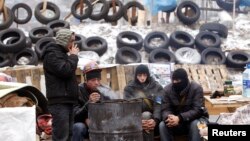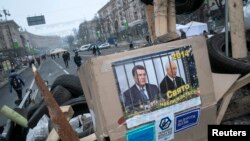MOSCOW —
Russia signaled on Monday it was about to agree to a loan and gas deal with Ukraine to help Kyiv stave off economic chaos and keep it in its former Soviet master's orbit.
In Kyiv, the opposition went ahead with preparations for another big rally for Tuesday against what they see as moves by President Viktor Yanukovich to sell out national interests to Russia after backing away from a landmark deal with the European Union that would have shifted their country westwards.
An aide to Russian President Vladimir Putin suggested a credit would be agreed at talks with Yanukovich in Moscow on Tuesday, and a Ukrainian minister said a deal was likely on lower prices for Russian gas.
Yanukovich has turned to Moscow for money after spurning the chance of joining a free trade pact with the EU, despite the risk of protests against him swelling.
“The situation in Ukraine is now such that without loans, from one side or another, they will simply fail to maintain economic stability,” Andrei Belousov, an economic adviser to Putin, told Interfax news agency. “I do not rule out that, if there is a request, a credit could be provided [to Ukraine].”
Russia's Finance Ministry confirmed talks on a loan were under way, and Ukrainian Energy Minister Eduard Stavitsky said there was a great probability a deal could be reached on reducing the price of Russian energy supplies to Ukraine.
Agreement on Tuesday would be seen in Moscow as a move keeping Ukraine in its political and economic orbit, more than two decades after the Soviet Union collapsed, and preventing a historic Westward shift by Kyiv.
The EU's enlargement chief said on Twitter on Sunday the 28-nation bloc was halting work on a trade and political pact with the country of 46 million because the deeds of Yanukovich and his government were “further and further apart.”
Stefan Fuele's words suggested the EU had lost patience with Kyiv's demands for financial aid and was irritated by the 'bidding war' with Russia over Ukraine. But divisions emerged in Brussels as other officials said the door remained open.
“I think making policy on the basis of a Twitter notice by Mr. Fuele is perhaps not the best way of approaching this issue,” Dutch Foreign Minister Frans Timmermans said.
Ukraine is seeking help to cover an external funding gap of $17 billion next year - almost the level of the central bank's depleted currency reserves.
Belousov did not say how much Russia, whose own economy is stuttering badly, would offer Ukraine. But sources in Ukraine said the deal could be worth $15 billion, with Russian providing about $3-5 billion up front.
The most Brussels has so far offered Ukraine is 610 million euros [$837.56 million] but EU officials are in discussion with the International Monetary Fund, the World Bank and other financial institutions on ways to help Ukraine.
Putin eyes victory
Apart from loans, Ukraine is seeking a lower price for Russian gas - now at around $400 per 1,000 cubic meters - to help it cope with its debt burden.
Ukrainian Prime Minister Mykola Azarov was quoted as saying on Sunday that he hoped a deal on a cheaper price for gas deliveries would soon be concluded. A reduction of at least 10-15 percent is likely, sources in Kyiv said.
Tuesday's talks are intended to conclude a “substantial package” of agreements to chart out a road map to removing trade barriers for Ukraine with Russia, both sides say.
Yanukovich may be attempting to keep the attention of both Moscow and Brussels to strike as good a deal as possible to handle its huge debt and outstanding gas payments to Moscow.
But it is a hazardous maneuver running the risk of alienating both parties and there is not certainty Ukraine can avoid default or a currency crisis.
Securing an agreement with Ukraine would be hailed in Russia as a geopolitical victory for Putin, who regards Ukraine as vital to his dream of creating a political and economic union stretching from the Pacific to the EU's eastern borders.
But Yanukovich is not expected to sign Ukraine up for a Russia-led customs union which Putin sees as the basis for his planned Eurasian Union stretching from the borders of Poland to the shores of the Pacific Ocean.
Holding out on membership on the customs union could be Yanukovich's last bargaining chip as he tries to balance East against West and secure a good enough deal to be able to survive the protests in Kyiv and win a presidential election in 2015.
In Kyiv, the main protest camp had thinned out again on Monday after about 200,000 people protested on Sunday. A few thousand people were listening to prayers, speeches and songs, trying to warm themselves after snowfall during the night.
But these numbers could swell again on Tuesday. Leaders of Yanukovich's Party of Regions expressed dissatisfaction with the economic crisis and urged Azarov to take action against ministers who had 'underestimated' the effects on the economy of trying to strike a deal with the EU.
In Kyiv, the opposition went ahead with preparations for another big rally for Tuesday against what they see as moves by President Viktor Yanukovich to sell out national interests to Russia after backing away from a landmark deal with the European Union that would have shifted their country westwards.
An aide to Russian President Vladimir Putin suggested a credit would be agreed at talks with Yanukovich in Moscow on Tuesday, and a Ukrainian minister said a deal was likely on lower prices for Russian gas.
Yanukovich has turned to Moscow for money after spurning the chance of joining a free trade pact with the EU, despite the risk of protests against him swelling.
“The situation in Ukraine is now such that without loans, from one side or another, they will simply fail to maintain economic stability,” Andrei Belousov, an economic adviser to Putin, told Interfax news agency. “I do not rule out that, if there is a request, a credit could be provided [to Ukraine].”
Russia's Finance Ministry confirmed talks on a loan were under way, and Ukrainian Energy Minister Eduard Stavitsky said there was a great probability a deal could be reached on reducing the price of Russian energy supplies to Ukraine.
Agreement on Tuesday would be seen in Moscow as a move keeping Ukraine in its political and economic orbit, more than two decades after the Soviet Union collapsed, and preventing a historic Westward shift by Kyiv.
The EU's enlargement chief said on Twitter on Sunday the 28-nation bloc was halting work on a trade and political pact with the country of 46 million because the deeds of Yanukovich and his government were “further and further apart.”
Stefan Fuele's words suggested the EU had lost patience with Kyiv's demands for financial aid and was irritated by the 'bidding war' with Russia over Ukraine. But divisions emerged in Brussels as other officials said the door remained open.
“I think making policy on the basis of a Twitter notice by Mr. Fuele is perhaps not the best way of approaching this issue,” Dutch Foreign Minister Frans Timmermans said.
Ukraine is seeking help to cover an external funding gap of $17 billion next year - almost the level of the central bank's depleted currency reserves.
Belousov did not say how much Russia, whose own economy is stuttering badly, would offer Ukraine. But sources in Ukraine said the deal could be worth $15 billion, with Russian providing about $3-5 billion up front.
The most Brussels has so far offered Ukraine is 610 million euros [$837.56 million] but EU officials are in discussion with the International Monetary Fund, the World Bank and other financial institutions on ways to help Ukraine.
Putin eyes victory
Apart from loans, Ukraine is seeking a lower price for Russian gas - now at around $400 per 1,000 cubic meters - to help it cope with its debt burden.
Ukrainian Prime Minister Mykola Azarov was quoted as saying on Sunday that he hoped a deal on a cheaper price for gas deliveries would soon be concluded. A reduction of at least 10-15 percent is likely, sources in Kyiv said.
Tuesday's talks are intended to conclude a “substantial package” of agreements to chart out a road map to removing trade barriers for Ukraine with Russia, both sides say.
Yanukovich may be attempting to keep the attention of both Moscow and Brussels to strike as good a deal as possible to handle its huge debt and outstanding gas payments to Moscow.
But it is a hazardous maneuver running the risk of alienating both parties and there is not certainty Ukraine can avoid default or a currency crisis.
Securing an agreement with Ukraine would be hailed in Russia as a geopolitical victory for Putin, who regards Ukraine as vital to his dream of creating a political and economic union stretching from the Pacific to the EU's eastern borders.
But Yanukovich is not expected to sign Ukraine up for a Russia-led customs union which Putin sees as the basis for his planned Eurasian Union stretching from the borders of Poland to the shores of the Pacific Ocean.
Holding out on membership on the customs union could be Yanukovich's last bargaining chip as he tries to balance East against West and secure a good enough deal to be able to survive the protests in Kyiv and win a presidential election in 2015.
In Kyiv, the main protest camp had thinned out again on Monday after about 200,000 people protested on Sunday. A few thousand people were listening to prayers, speeches and songs, trying to warm themselves after snowfall during the night.
But these numbers could swell again on Tuesday. Leaders of Yanukovich's Party of Regions expressed dissatisfaction with the economic crisis and urged Azarov to take action against ministers who had 'underestimated' the effects on the economy of trying to strike a deal with the EU.






